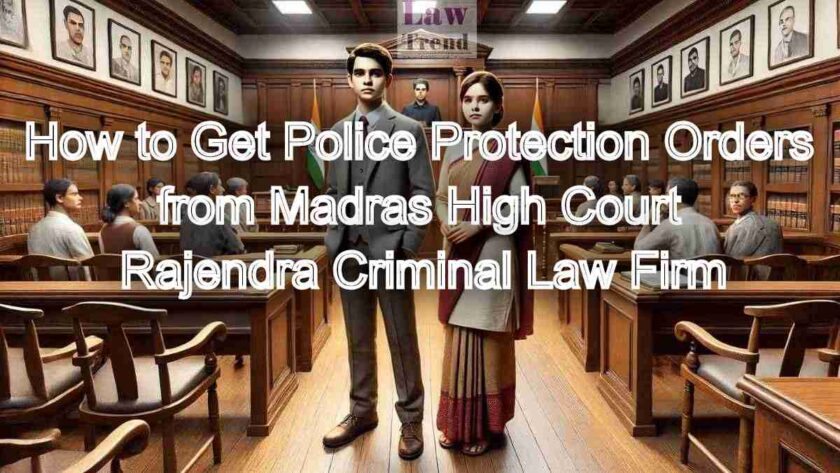How to Get Police Protection Orders – The Madras High Court plays a vital role in ensuring justice and protecting fundamental rights. One of the key reliefs the court provides is a police protection order. Many individuals and businesses face threats, intimidation, and interference. In such situations, they often seek legal remedies to safeguard their lives and property. Rajendra Criminal Law Firm has helped countless clients secure effective police protection orders. With strong representation and knowledge of legal procedures, the firm ensures clients get timely relief.
How to Get Police Protection Orders from Madras High Court: Rajendra Criminal Law Firm
Understanding Police Protection Orders
A police protection order is a legal direction from the High Court to the police authorities. It instructs them to provide necessary protection to a person, property, or business. These orders act as a shield against unlawful acts, harassment, and threats. The court issues such orders under its extraordinary jurisdiction. This jurisdiction arises under Article 226 of the Constitution of India.
The objective of these orders is to prevent law and order issues before they escalate. Moreover, such orders guarantee that individuals can carry on with their lawful activities without hindrance.
When Can You Seek Police Protection
There are several circumstances when a person can move the Madras High Court. First, when private disputes lead to violence or criminal intimidation. Second, when business disputes result in threats to property or staff. Third, when family disputes involve unlawful obstruction to rights. Fourth, when community or political conflicts create danger to life.
In all these situations, the High Court can intervene. The petitioners must show that local police authorities either failed to act or acted with bias. Only then will the court consider granting police protection orders.
Legal Grounds for Relief
The High Court exercises its power under Article 226. This provision allows the court to issue writs for enforcement of rights. The writ petition for police protection is filed when fundamental rights such as the right to life and personal liberty are under threat.
The petitioner must also highlight provisions under the Code of Criminal Procedure. Sections dealing with preventive measures and maintenance of law and order strengthen the plea. In many cases, courts also rely on precedents to justify orders. Judicial precedents ensure consistency in granting police protection.
Filing a Writ Petition
The process begins with filing a writ petition before the Madras High Court. The petition should clearly describe the facts and nature of threats. It must also explain the failure of local police officers in providing protection. Legal documents such as complaints, FIR copies, or representations to police must be attached.
The petition must also request the High Court to issue directions to the police. This includes continuous protection, periodical monitoring, and reporting of compliance. The drafting of the petition requires accuracy and precision. Legal terms like “mandamus” and “infringement of rights” must be used appropriately.
Role of Criminal Lawyers
At this stage, the role of experienced criminal lawyers becomes crucial. Rajendra Criminal Law Firm has a team of advocates skilled in criminal jurisprudence. They prepare the petition, gather evidence, and argue the case with clarity. Lawyers also counter objections raised by the government counsel.
Without professional representation, a petitioner may face delays or dismissal. Expert lawyers understand court procedure, evidentiary rules, and statutory interpretation. Their experience ensures that the petition meets the standards expected by the judges.
Court Proceedings
After the petition is filed, the High Court issues notice to the respondents. The respondents generally include the Commissioner of Police and other law enforcement officials. They are required to file counter affidavits explaining their stand.
During hearings, the court examines the urgency of the matter. If there is an imminent threat, the court may pass interim orders granting temporary protection. Later, after reviewing all documents and hearing arguments, the court passes a final order.
The final order clearly directs police officers to ensure protection. In some cases, the court warns officers of contempt if they fail to comply. Thus, the order carries legal authority and accountability.
Importance of Evidence
Evidence plays a decisive role in securing police protection orders. Documentary evidence like complaints, FIRs, or medical records helps prove threats. Affidavits from witnesses strengthen the case. Photographs, videos, or call recordings may also be submitted.
Courts rely on such evidence to determine whether the threat is genuine. Without proper evidence, petitions may get dismissed. Therefore, collecting and presenting evidence is essential.
Common Challenges
Several challenges arise while seeking police protection. Sometimes, authorities deny threats and argue that local remedies exist. At other times, they claim that the petitioner exaggerates the situation. Courts also face false petitions filed for personal gains.
To overcome such challenges, lawyers must present facts convincingly. They must show that the petitioner exhausted all remedies before approaching the High Court. They must also emphasize that denial of protection would violate constitutional rights.
Preventive and Permanent Protection
The High Court grants both preventive and permanent protection orders. Preventive protection is temporary. It is provided during festivals, family events, or specific incidents. Permanent protection is continuous and remains until further orders.
The court decides the type of protection based on the facts. If a threat is long-term, permanent orders may be issued. However, if the issue is short-lived, preventive orders suffice.
Rights of Citizens
Every citizen has the right to approach the High Court. The right to life under Article 21 includes the right to live safely. Citizens cannot be forced to tolerate harassment or threats. Police protection orders uphold this right.
Citizens must also remember that misuse of this right can lead to dismissal and penalties. Filing false petitions may attract costs and contempt proceedings.
Benefits of Legal Assistance
Legal assistance ensures smooth navigation of court procedures. Lawyers from Rajendra Criminal Law Firm guide clients from filing to execution of orders. They also follow up with police authorities for compliance.
Professional support gives confidence to clients. It assures them that their rights are defended strongly. With proper representation, clients secure timely justice and protection.
Execution of Orders
Once the High Court grants police protection, execution is vital. The police authorities are duty-bound to comply with the order. If they fail, lawyers can file contempt petitions.
Contempt proceedings force officers to follow directions. Thus, execution is as important as obtaining the order itself. Continuous monitoring ensures the petitioner’s safety.
Case Studies and Judicial Trends
Over the years, the Madras High Court has passed several landmark orders. These include protection for industrialists, businessmen, and ordinary citizens. Courts have often stressed that law and order cannot be compromised. Judicial trends show that courts lean towards protecting life and liberty. However, they also caution against misuse. The balance between protection and misuse is carefully maintained.
Frequently Asked Questions
A police protection order is a judicial directive issued by the Madras High Court. It instructs police authorities to safeguard an individual, property, or business from threats, harassment, or unlawful interference. The order ensures enforcement of the fundamental right to life and liberty under Article 21 of the Constitution.
Any citizen who faces genuine threats to life, liberty, or property can apply. Individuals, families, business owners, and even organizations are eligible. The applicant must demonstrate that local police either refused help or failed to act impartially. Proper documentation strengthens the claim.
You must file a writ petition under Article 226 before the Madras High Court. The petition should explain the threats faced, mention earlier complaints to the police, and provide supporting evidence such as FIRs, complaints, or witness affidavits. A criminal lawyer drafts and submits the petition on your behalf.
Lawyers prepare the case, collect evidence, and argue before the court. They highlight constitutional rights, cite criminal law provisions, and counter government objections. Experienced advocates also follow up with police authorities to ensure compliance with the court’s order.
If police authorities ignore the court’s order, you can initiate contempt proceedings. The High Court can summon officers, impose penalties, and direct strict compliance. This ensures accountability and guarantees that the protection granted is effectively executed.
Conclusion
Police protection orders are a powerful legal tool. They provide safety to individuals and safeguard constitutional rights. The Madras High Court has consistently upheld these principles.
Rajendra Criminal Law Firm ensures that clients receive effective relief through proper legal strategy. With expertise in criminal law, the firm secures protection quickly and efficiently. In conclusion, every citizen must know their right to seek protection. With the right legal team, filing a petition becomes easier. Courts act promptly when genuine threats exist. Therefore, timely legal action can save lives, protect businesses, and maintain peace.
Read More
- Contempt of Court Cases in Madras High Court: Process & Punishments
- Writ Petition vs Criminal Revision: What to File in Madras High Court and When?
- Recent Criminal Appeals Allowed by the Madras High Court – 2025 Review
- Anticipatory Bail in Tamil Nadu: Strategies That Work in Madras High Court
- Supreme Court Stays: When and How to Get One for Ongoing Cases
- Madras High Court – Official Website





